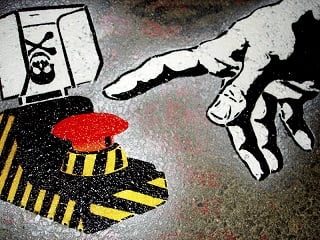
I have often wondered why humanity, cyclically and repeatedly, decides to hurt itself by going to war. Now and then, if not constantly, somewhere over the planet, gunfire is heard, people die or get hurt, and cities are ravaged. Ravaged but sometimes reconstructed, only to bear the same fate years later.
By Jean-Marie Kassab
The recent events in Central Europe made me wonder in awe once more. What is going on in Ukraine and the consequences of it are scary. Taboo statements were made. The taboo about world war three but mostly the N-word. Nuclear war.
The situation in the Pacific could worsen anytime. The situation in the Middle East is worrying despite the Iranian-Saudi reconciliation, whose consequences are yet to be verified. Kim Jong Un’s fondness for ballistic missiles while his people are starving is insane lately, the events in Sudan.
History books witness this cycle that seems eternal and bound to happen repeatedly. The future of humanity is bound to be the same, with more wars that are and will unfold into an endless repetition of History.
History has this nasty and unbreakable tendency to repeat itself, like a curse or a spell cast by a devilish power. History pages are written mainly with the blood of those who died during violent events.
And this is what I fail to understand: Why lessons were never learned. Why rightful and durable lessons were never laid on the table, and if they did, it was for a short time before the evil of war bounced back as fearsome and destructive as ever.
And here we go again, at the edge of a major war, possibly a world war, the third one, in almost one hundred years. Humanity was supposed to have become more intelligent, wiser and better, more educated than ever. Most obviously, it did not.
Thanks to the vast technological advances, people were supposed to have become more intelligent, wiser and better informed about the dangers of war. They did not. People travel, interact, and eventually accumulate more wisdom thanks to their longer life span.
Learning has become more available and illiteracy scarcer. There may have been a couple of universities in the world during the dark ages. There are thousands of them and hundreds of millions of students who seek knowledge every year behind school desks.
So why the heck doesn’t anybody learn?
Globalisation has failed. When the Covid epidemic hit, countries worldwide discovered that their people come first, not the planet. Nationalism arose. Many Italians burned the European flag in response to the lack of support of the European Union, whose members were worried about their fate.
Airports were closed. Resources were scattered all over the world while being badly needed locally. Economies have crumbled down. Anxieties have built up. Old feuds came back to life. Imperialistic ambitions found their way back into leaders’ minds. Putin is one example. China seized the opportunity to accelerate its global ambitions of eventually becoming the Superpower.
Apparently, a new world order is being built. Yet it is too early to see it done. The problem is that such shakeups usually involve violence and wars until things settle down. Wait and see until then while keeping your head low and safe if you can.
What can you do?
Jean-Marie Kassab (1960) has a degree in Sciences from the American University of Beirut. After an extensive business career, he became a writer/author a few years ago with a bestseller on his list of publications. He is a passionate amateur historian, a painter, and an art lover at large. He is currently focusing on a non-fictional publication about the history of ideas.




